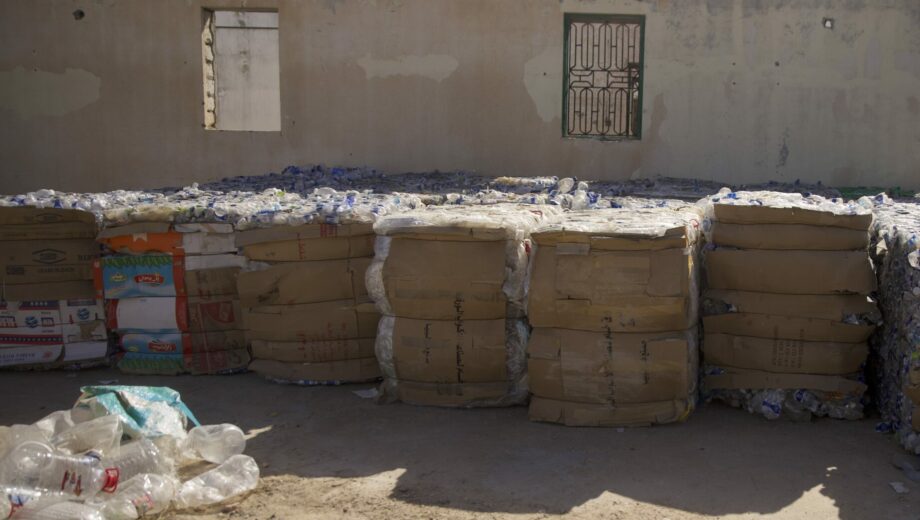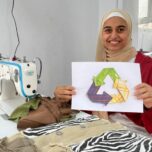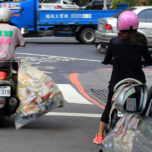March 14, 2024 —  Editor’s note: This story is part of a collaboration between Ensia and Egab exploring environmental efforts by communities facing potentially more urgent concerns such as war and poverty. Egab is a media startup that helps young local journalists from across the Middle East and Africa get published in regional and international media outlets, with a focus on solutions journalism. You can read the first two stories in the series here and here.
Editor’s note: This story is part of a collaboration between Ensia and Egab exploring environmental efforts by communities facing potentially more urgent concerns such as war and poverty. Egab is a media startup that helps young local journalists from across the Middle East and Africa get published in regional and international media outlets, with a focus on solutions journalism. You can read the first two stories in the series here and here.
For Mustafa Balhaj, a 64-year-old retired teacher from Al-Khums, a coastal city in Libya, the plastic waste increasingly burying his hometown’s beaches was distressing.
The city, home to the UNESCO World Heritage Archaeological Site Leptis Magna, had seen the flow of tourists dry up due to years of civil conflict that began in 2011 in the country. The combination of war — which destroyed infrastructure and brought an influx of internally displaced people — and the loss of tourism exacerbated plastic pollution, leaving Balhaj desperate for a solution.
“People dumping their garbage everywhere is what I needed to stop,” he says. “Our beaches were covered in piles of garbage and construction debris.”
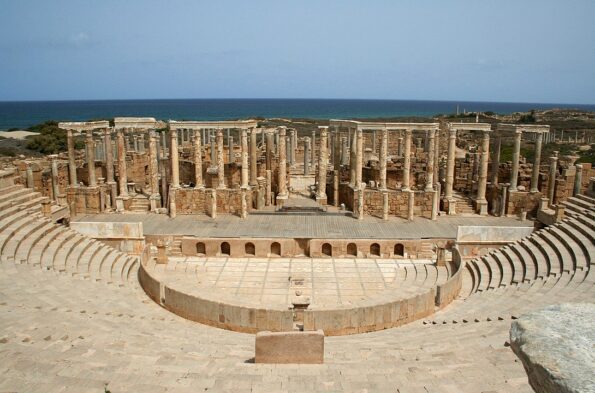
Al-Khums, a coastal city in Libya, is home to the UNESCO World Heritage Archaeological Site Leptis Magna. Photo by David Gunn, public domain
Across Libya plastic is either buried in landfills, where it can potentially contaminate soil and water; incinerated, releasing toxic pollutants into the atmosphere; or simply piled up.
And the problem is enormous. Libya creates 350,000 metric tons (386,000 tons) of plastic waste each year, according to General Services Company (GSC), a government entity that oversees waste management.
Muhammad Masoud, head of human resources at GSC, says most of the plastic doesn’t get sorted from the trash, “partly because Libya doesn’t have regulations governing how to deal with plastic waste.”
“I felt it was my calling to clean the beaches and the city. I pursued that.” —Mustafa Balhaj
With the country torn between two feuding governments and experiencing a fragile cease fire, regulating the management of plastic waste is low on most politicians’ and decision-makers’ minds. The nation’s economy has shrunk, with GDP per capita in the country halving between 2010 and 2022 and unemployment rates hovering around 20%. People struggle to get proper health care and education since many schools and hospitals have been destroyed. And the country faces the potential for violence over its oil reserves and is coping with boats full of migrants that capsize off the coasts.
Balhaj had no answers for some of these pressing issues, but he saw in the increasing plastic waste a place where he could make a difference.
“I felt it was my calling to clean the beaches and the city,” he says. “I pursued that.”
As it turned out, what he and others have been doing to address the plastic waste problem is not only cleaning up the environment, but addressing some of the other challenges Libyans face too.
Making It Happen
Unsure of where to begin, in 2018 Balhaj started holding awareness campaigns about recycling at universities in Al-Khums, in hopes of getting younger Libyans involved. Given the years of war and economic crisis, since political and armed strife took hold of Libya in 2011, he wasn’t sure cleaning up plastic pollution would feel important enough for anyone to get involved.
Yet, dozens of young volunteers joined Balhai’s efforts, looking to contribute something positive. “The initiative initially gave me a purpose,” says Sameer Nouri, who had lost his job as a tour guide. Similarly, Mousa Abdelqader says he “found the idea of making a difference compelling.”
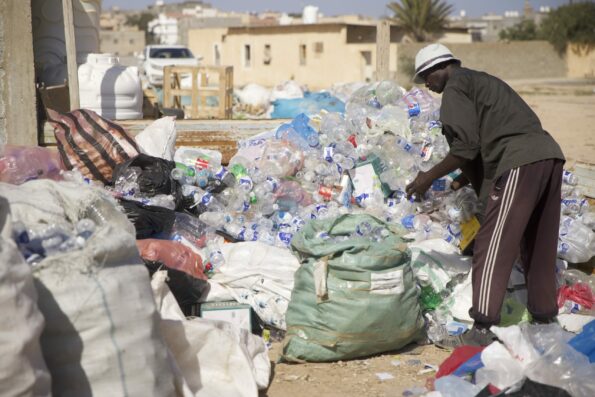
Aside from recycling tons of plastic and financing the treatment of cancer patients, the recycling of plastic has also created jobs. Photo by Radwan Khashim
When Abdelqader had the idea to press the plastic and sell it for reuse, the group ran a fundraising drive to purchase the necessary machinery. Within three months, the initiative made US$4,200 by selling the pressed plastic to Europe, which they used to buy even better machinery and to pay some individuals involved. Nouri, for example, is one of eight members who, for a monthly income, empty 22 baskets distributed for collecting plastic and cardboard on streets and in parks, hospitals and sporting clubs.
Fatma Abouzeid, a medical student who volunteers with the group, sees the success as vindication. “It was a recognition of the months of hard work, and proof that we’re capable of anything, if we put our minds to it,” she says.
Saving Lives with Scraps
As the scrappy team of environmentalists launched their full-fledged recycling operation, then called Purity Association, in 2019, conflict broke out yet again around Tripoli, the country’s capital. Scores of Libyans fled the violence to nearby cities like Zliten, Misrata and Al-Khums.
Balhaj began meeting displaced Libyans who couldn’t afford medical care, including treatment for cancer. “The stories were heartbreaking, and their suffering was real. So, we designated the organization’s revenues to support cancer patients,” he says. To reflect the new mission, the organization’s name was changed to Al-Khums Oncology Patients Association (KOPA).
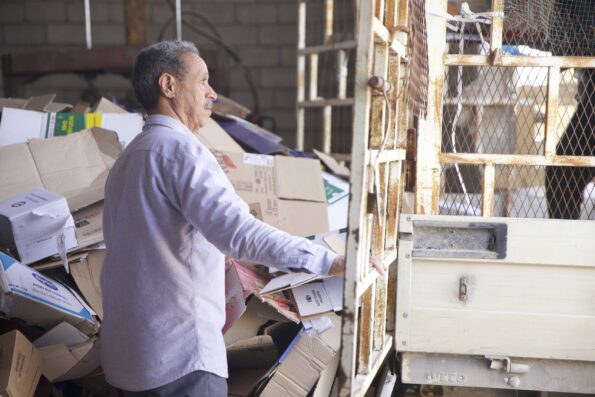
Mustafa Balhaj supervises the process of sorting the plastic waste ahead of its recycling by Al-Khums Oncology Patients Association (KOPA). Photo by Radwan Khashim
In war-torn Libya, the healthcare sector has been hit hard. Since 2011, armed conflict and short-lived governments have decimated health services. The supply of critical medicines has dwindled, sending prices soaring. And doctors are in short supply. At the National Institute of Oncology in Misrata, limited financial resources mean the wait for an examination or to get a bed can stretch for weeks, reducing the success rate for life-saving treatment.
KOPA is helping to alleviate that with the fruits of its cleanup work. By recycling about 3 metric tons (3.3 tons) of garbage per day, it is bringing in enough money to support about 40 cancer patients each month with chemotherapy treatment and providing money for other facility needs.
Enabling the Vulnerable
Only 37 miles (59 kilometers) southeast of Al-Khums, in Zliten, revenues from recycling plastic are supporting vulnerable people in another way.
Since December 2021, Adel Al-Rutb has been recycling plastic to fund programs that empower women with disabilities, widows and divorced women by teaching them skills that open the door to employment opportunities and help integrate them into a patriarchal society that can be alienating to those who don’t easily fit in because of their circumstances.
“I have always had the environment on my mind but never got around to acting on it, until I saw the possibility of helping out the most vulnerable while protecting the environment,” Al-Rutb explains. He says he was motivated by the decline of Libya’s social protection system in the wake of the war.
His team of 21 members, who go by the name Martyr Organization, recycles up to 3 tons (2.7 metric tons) of plastic per month. The profit is used to help women learn to make woolen textiles and accessories, which enables them to sustain a living for themselves and their families.
Fawzia Manita had been unable to hold a job because of a disability she developed as a child from polio. “My days were void of purpose. I woke up, ate and slept to wake up to another aimless day — until I was introduced to Martyr Organization, and I joined their sewing classes,” she says. “Within months, I was able to start my own business. …I would never have thought that this could all be made possible from pieces of scrap.”
“I’m proud of the work we do and hope it sets an example for Libyan society to improve the circumstances of women with disabilities, or those who are widowed or divorced,” says Al-Rutb.
Balhaj, for his part, says he’d like to do even more in the future. “I don’t want it to stop here,” he says. “We want to be able to help more people and clean more cities.”
Related Posts
Ensia shares solutions-focused stories free of charge through our online magazine and partner media. That means audiences around the world have ready access to stories that can — and do — help them shape a better future. If you value our work, please show your support today.
Yes, I'll support Ensia!